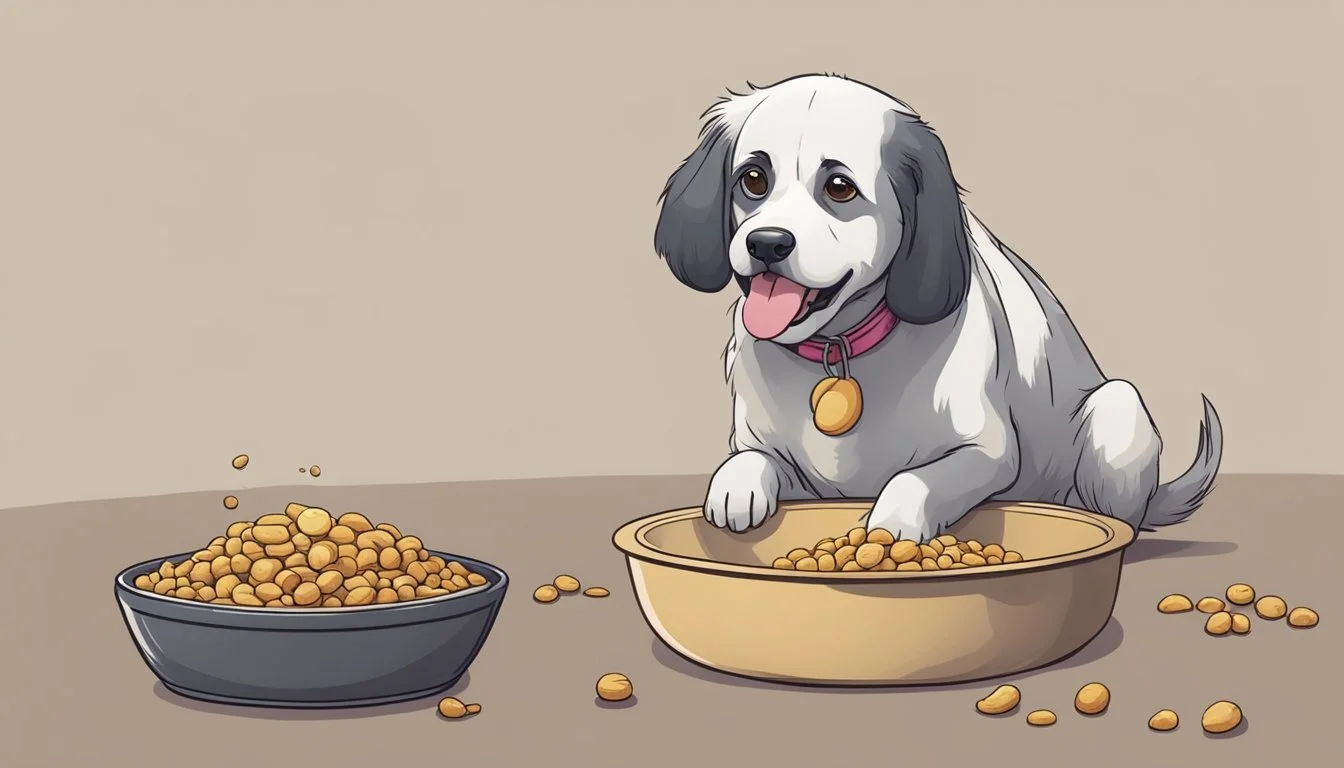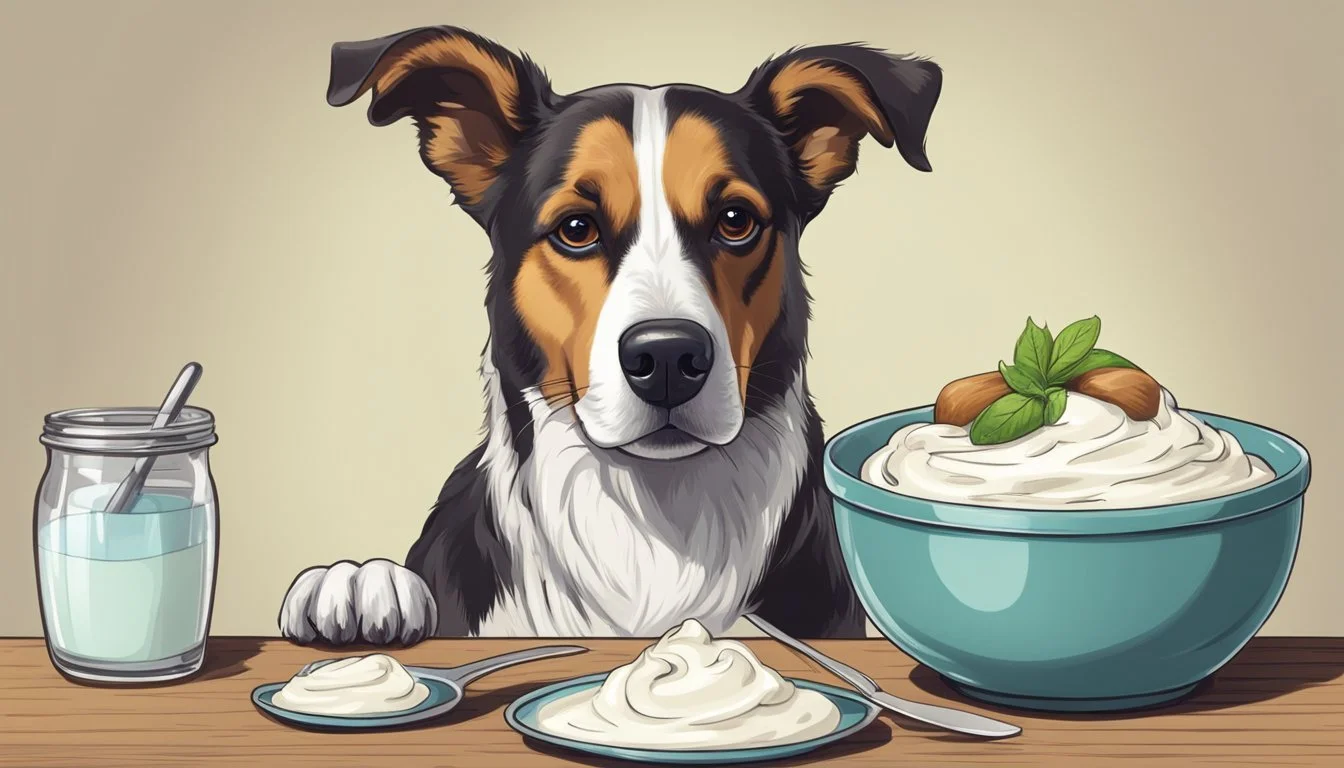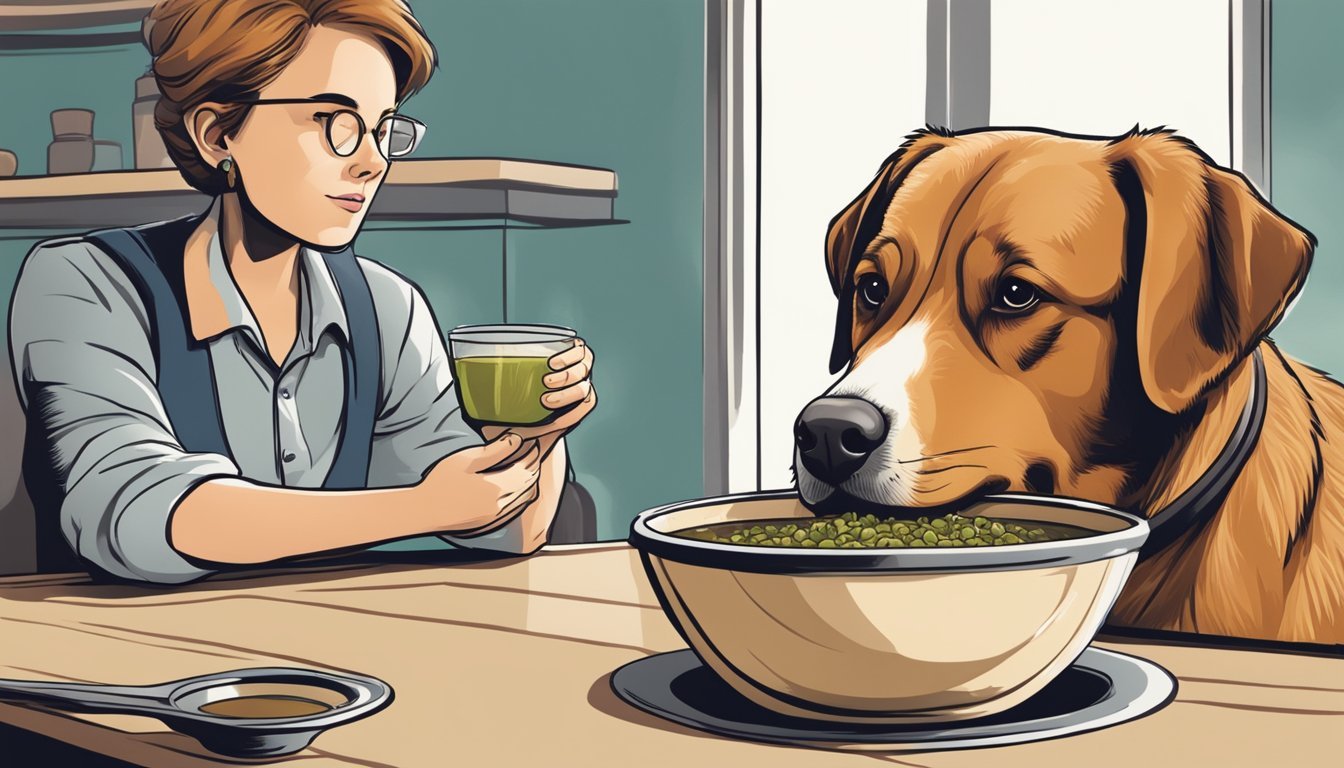Soothing Foods to Help Your Dog Recover from Diarrhea
Dealing with a dog experiencing diarrhea can be quite distressing for pet owners. Ensuring your dog receives the right food during this time is crucial to help stabilize their digestive system and promote recovery.
Feeding the appropriate foods can help alleviate symptoms and support your dog's gastrointestinal health. This article will guide you on what foods can aid your dog during bouts of diarrhea and provide tips to ensure your furry friend returns to their normal, happy self swiftly.
1) Boiled Chicken
Boiled chicken is a highly recommended option for dogs with diarrhea. Its simplicity and high digestibility make it perfect for easing a dog's upset stomach. Use skinless, boneless chicken breasts to ensure the meal is low-fat, which reduces strain on the digestive system.
To prepare, boil the chicken until fully cooked, then shred it into small, bite-sized pieces. This helps dogs chew and digest the chicken more easily. Avoid adding any spices, oils, or butter during cooking, as these can irritate the stomach further.
Combine the chicken with white rice in a 1:1 ratio. This mixture provides a bland diet that is gentle on the digestive tract while still offering necessary nutrients. Plain boiled chicken alone can also be fed in small, frequent meals to help stabilize your dog's stomach.
Boiled chicken should always be served warm or at room temperature, as very hot or cold food can sometimes cause further stomach upset. Be sure to start with small portions and gradually increase the amount depending on the dog's size and response to the diet.
2) Pumpkin Puree
Pumpkin puree is widely recommended for managing dog diarrhea due to its high fiber content. It contains both soluble and insoluble fibers, which work together to support healthy digestion.
Soluble fiber absorbs water and slows the digestive process, which can help form solid stools. Insoluble fiber, on the other hand, adds bulk and promotes regular bowel movements.
Pumpkin also supplies essential vitamins and minerals such as vitamins A, E, and C, potassium, and iron. These nutrients can help maintain overall health and well-being in dogs.
It is best to mix pureed pumpkin into the dog's regular food. Moderation is key, as excessive fiber can lead to other digestive issues. Generally, 1-4 tablespoons are sufficient, but consulting with a vet before adding it to a dog's diet is wise.
Cooked or canned pumpkin is usually preferred over raw pumpkin. Canned pumpkin should be pure and free from added sugars, spices, or preservatives, which could harm dogs.
The soothing properties of pumpkin make it a gentle option for dogs with sensitive stomachs. While pumpkin puree is helpful, it's not a cure-all and should be part of a broader approach to treating diarrhea in dogs.
3) White Rice
White rice is often recommended for dogs experiencing diarrhea. Its bland and easily digestible nature makes it gentle on a dog’s stomach. When preparing rice for dogs, it’s essential to use plain, well-cooked white rice.
Avoid using instant or parboiled rice, as these can be too high in starch, potentially leading to constipation. Cook the rice thoroughly, either by using a microwave or stovetop, without adding any spices or seasonings.
A small portion should be offered, especially for toy and small breed dogs, starting with 1 to 2 tablespoons. Medium and larger breeds can be given between 1/8 to 1/4 cup in multiple mini-meals throughout the day.
Rice helps to firm up stools due to its low fiber content. Pairing the rice with boiled, boneless chicken breast can create a balanced, bland meal that can further aid in easing diarrhea symptoms.
Ensure the rice is freshly prepared and served at room temperature. Always monitor the dog's response to the rice diet and consult a veterinarian if symptoms persist or worsen. Proper hydration should also be maintained alongside the rice diet to support overall recovery.
4) Plain Yogurt
Plain yogurt can be a beneficial food for dogs suffering from diarrhea. The probiotics found in yogurt help maintain a healthy balance of good bacteria in a dog’s gut. This can support digestion and potentially alleviate symptoms of diarrhea.
When introducing yogurt to a dog's diet, it's essential to use plain, low-fat yogurt without any added sugars or artificial sweeteners. Small dogs can be given around 1 tablespoon per day, while larger dogs may require 2 to 3 tablespoons daily.
Starting with a smaller amount can help gauge the dog’s tolerance to yogurt. If a dog shows signs of improvement and no adverse reactions, the daily amount can be maintained or slightly increased based on the dog's size and response.
Yogurt's probiotic content aids in restoring the balance of intestinal flora disrupted during episodes of diarrhea. This can promote firmer stools and better overall digestion. It's advisable to consult a veterinarian before introducing yogurt, especially if the dog has any known dairy sensitivities or ongoing medical conditions.
In summary, plain yogurt, given in measured amounts, can be a useful addition to a dog’s diet to help manage diarrhea and support gut health.
5) Bone Broth
Bone broth is a nutritious option that can benefit dogs with diarrhea. It is made by simmering animal bones in water, often with added apple cider vinegar to help extract nutrients.
This broth is rich in essential minerals and nutrients like glucosamine, chondroitin, and hyaluronic acid. These components support joint health and overall well-being.
For dogs experiencing diarrhea, bone broth can be soothing and hydrating. Its gelatin content helps to firm up stools by binding with water in the intestines.
Additionally, bone broth can be enticing for picky eaters, making it easier to ensure they are consuming enough fluids and nutrients during recovery.
When preparing bone broth, it’s important to avoid adding any spices or seasonings. These can be harmful to dogs.
Straining out all bone fragments is crucial, as cooked bones can pose a choking hazard or cause internal injury. Always ensure that the broth has cooled before serving.
Bone broth is straightforward to make at home and can be a beneficial addition to your dog's diet.
6) Sweet Potatoes
Sweet potatoes can be a beneficial addition to a dog's diet if they are experiencing diarrhea.
They are rich in dietary fiber, which supports digestive health. This can help to firm up the stool and provide relief.
It's important to cook the sweet potatoes before serving them to dogs. Raw sweet potatoes can be difficult for dogs to digest and might contain compounds that are not safe.
Baking or boiling sweet potatoes until they are soft is recommended. Always avoid adding any seasoning or butter.
For small to medium dogs, 1-3 teaspoons of cooked sweet potatoes should be sufficient. Larger dogs can be given 1-3 tablespoons.
Introduce sweet potatoes gradually and monitor the dog's response. If diarrhea persists, consult a veterinarian.
Sweet potatoes are not a complete solution but can provide temporary relief as part of a balanced approach to managing dog diarrhea.
7) Oatmeal
Oatmeal is a gentle and nutritious option for dogs experiencing diarrhea. It provides a source of soluble fiber, which can help to firm up stool and promote more regular bowel movements.
When preparing oatmeal for a dog, it is important to use plain, unsweetened oats. Flavored or instant oatmeal may contain additives harmful to dogs.
A general guideline is to offer one tablespoon of cooked oatmeal for every 20 pounds of the dog's weight. Avoid adding any sweeteners or toppings, as these can further irritate the digestive system.
Oatmeal should be cooked until soft and cool before serving. This ensures it is easy for the dog to digest. Start with a small amount and gradually increase depending on the dog's tolerance.
Monitoring the dog's reaction after introducing oatmeal is essential. If any adverse reactions occur, stop feeding oatmeal and consult a veterinarian.
8) Cottage Cheese
Cottage cheese can be beneficial for dogs dealing with diarrhea if they are not lactose intolerant. It contains a good balance of protein and fat, which can help to firm up their stools.
The probiotics in cottage cheese, such as Lactobacillus acidophilus, support a healthy gut by maintaining a balanced gut microbiome. This can be crucial for dogs experiencing digestive issues.
Due to its high moisture content, cottage cheese helps keep dogs hydrated, which is important during episodes of diarrhea. The mild nature of cottage cheese also makes it easily digestible.
Feeding cottage cheese sparingly is important. Large amounts can potentially worsen diarrhea due to its richness. Mixing it with rice can provide a balanced meal that is gentle on your dog's digestive system. Always consult with a vet before making significant changes to your dog’s diet.
9) Probiotics
Probiotics play an essential role in managing diarrhea in dogs. These beneficial bacteria help balance the gut microbiome by increasing the number of good bacteria.
Probiotics have been found effective in addressing diarrhea caused by stress, dietary changes, or infections. They can shorten the duration of diarrhea and provide relief.
Certain species, such as Bacillus and Enterococcus faecium, have specific benefits. Bacillus species support the immune response, while Enterococcus faecium is known to lessen the severity and length of diarrhea episodes.
Using probiotics can also aid dogs with food allergies. They help improve digestion and strengthen the dog's immune system.
Commercial dog probiotic supplements are available in various forms, such as powders, capsules, and chews. Ensuring the product's quality and suitability for the dog's specific needs is important.
Adding probiotics to a dog's diet can have additional benefits beyond diarrhea management, including better overall gut health and potentially reducing bad breath.
10) Banana
Bananas can be a beneficial addition to a dog's diet, particularly if they are experiencing diarrhea. These fruits are rich in dietary fiber, which helps regulate the digestive system.
The fiber content in bananas aids in firming up stool, making it a natural remedy for diarrhea. Additionally, bananas are gentle on the stomach, reducing the risk of irritation.
Bananas also provide essential nutrients such as potassium and vitamins, which are vital for a dog's overall health. They can help replenish electrolytes lost due to diarrhea, promoting recovery and maintaining hydration.
When feeding bananas to a dog, it's important to offer small amounts. Overfeeding can lead to constipation due to the high fiber content. For small dogs, a few slices are sufficient, while larger breeds might benefit from half a banana.
Always ensure the banana is ripe and remove the peel, as it can be difficult for dogs to digest. Introduce bananas slowly and monitor the dog's response, adjusting the amount if any adverse reactions occur.
While bananas are generally safe, it's advisable to consult a veterinarian before adding new foods to a dog's diet, especially if they have ongoing health issues.
Understanding Dog Diarrhea
Diarrhea in dogs can be triggered by several factors and it's essential to recognize both the causes and symptoms. While some cases resolve on their own, others require veterinary attention.
Common Causes
There are multiple reasons why a dog might experience diarrhea. Dietary indiscretion, such as eating spoiled food or garbage, is a frequent culprit. Food allergies and sensitivities are also common, as well as changes in diet.
Parasites, including worms and protozoa, can irritate the gastrointestinal tract. Infections from bacteria, viruses, or fungi are other potential causes. Additionally, stress, antibiotics, and toxins can lead to loose stools. Each cause requires a different approach to treatment, making identification crucial.
Symptoms to Watch For
Besides frequent loose or liquid stools, other symptoms often accompany diarrhea. Lethargy, loss of appetite, and vomiting are significant signs that warrant concern. Dogs might also exhibit abdominal discomfort, expressed through whining or restlessness.
Mucus or blood in the stool can indicate a more severe issue. Dehydration is a pressing risk, especially in puppies and senior dogs. Monitoring for increased thirst or dry gums is essential. Recognizing these symptoms early can help in managing the condition effectively.
When to See a Vet
While mild cases of diarrhea can often be managed at home, certain situations require immediate veterinary attention. If diarrhea persists for more than 48 hours, or if the dog shows signs of severe dehydration, it's time to call the vet.
Presence of blood or a sudden onset of explosive diarrhea should not be ignored. Also, if your pet has a pre-existing health condition or is taking medication, professional advice is necessary. Early intervention can prevent complications and ensure your dog recovers promptly.
Dietary Modifications
When managing a dog's diarrhea, dietary changes are essential. Ensuring proper hydration and avoiding certain foods can help ease symptoms and promote recovery.
Hydration Tips
Maintaining hydration is crucial when a dog has diarrhea. Diarrhea can lead to dehydration, so providing fresh water is necessary.
Using electrolyte solutions can replenish lost minerals. Small, frequent amounts of water or electrolyte solution are recommended. For example, offer toy and small breeds 2 to 3 milliliters every 30 to 60 minutes. Medium and large breed dogs can start with ⅛ cup to ¼ cup during the same time period.
Ice chips can also encourage fluid intake if your dog is reluctant to drink. Bone broth without salt or spices can be an appealing option as it offers both fluids and some nutrients.
Foods to Avoid
Certain foods can exacerbate diarrhea and should be avoided. Dairy products like milk and cheese can worsen symptoms as many dogs are lactose intolerant. High-fat foods can also lead to digestive issues and should be excluded from their diet.
Table scraps, especially those containing seasoning and spices, should be avoided. Ingredients like onions, garlic, and artificial sweeteners (e.g., xylitol) are harmful to dogs.
Opt for a bland diet with low-fat meats such as boiled chicken, and avoid raw or undercooked meats which carry the risk of bacterial infections. Taking these precautions can help facilitate a smoother recovery for your dog.
Home Remedies and Treatments
Proper home remedies and treatments can aid dogs with diarrhea by stabilizing their digestive systems and ensuring they stay hydrated.
Probiotics and Supplements
Probiotics can be beneficial for dogs suffering from diarrhea. They help restore the balance of good bacteria in the gut. Plain yogurt and specially formulated probiotic supplements are good choices to support gut health.
Pumpkin, high in fiber, is another effective supplement. For small dogs, 1-3 teaspoons are recommended, while larger dogs can have 1-3 tablespoons. Slippery elm and marshmallow root are additional supplements that may soothe the digestive tract. Always consult a vet before adding new supplements to ensure they are safe for your dog.
Rest and Recovery
Rest is crucial during the recovery period. Short-term fasting can help reset the digestive system. Fasting for 12 to 24 hours, followed by a bland diet, is often recommended. Bland foods like boiled chicken, white rice, or bone broth can be introduced gradually.
Hydration is paramount, as diarrhea can lead to dehydration. Offer small amounts of water frequently. For smaller breeds, 2-3 milliliters every 30-60 minutes works well. Medium and large breeds may need 1/8 to 1/4 cup during this period. Regular monitoring and adjustment based on the dog's response will help stabilize their condition.







